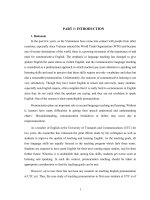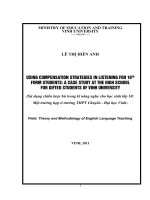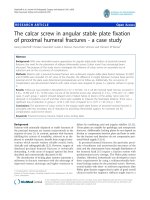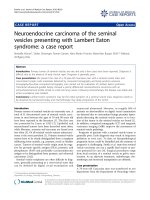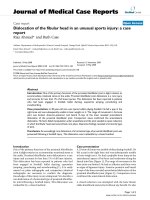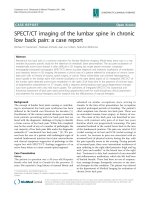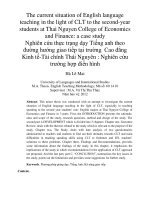Error Analysis of the Written English Essays of Pakistani Undergraduate Students: A Case Study docx
Bạn đang xem bản rút gọn của tài liệu. Xem và tải ngay bản đầy đủ của tài liệu tại đây (310.13 KB, 23 trang )
Asian Transactions on Basic & Applied Sciences (ATBAS ISSN: 2221-4291) Volume 01 Issue 03
July 2011 ATBAS-10124032©Asian-Transactions 29
Error Analysis of the Written English Essays of Pakistani
Undergraduate Students: A Case Study
Summaira Sarfraz, Assistant Professor,
Email
Department of Sciences and Humanities
FAST-National University of Computer and Emerging Sciences Lahore Campus, Pakistan
Abstract
The study aims to examine the errors in a
corpus of 50 English essays written by 50
participants (undergraduate Pakistani
students). These participants are non native
speakers of English language and hail from
Intermediate background with weak English
writing skills. The instrument used for the
study is students‟ written essays in English
language. I followed Rod Ellis‟s (1994)
procedural analysis of errors; collection of
sample of learner language, identification of
errors, description of errors, explanation of
errors, and evaluation of errors in analyzing
50 English essays. The occurrences of two
types of errors; Interlanguage errors and
mother tongue (MT) interference errors have
been compared and the results show that the
percentage of the occurrences of
Interlanguage errors is higher than those of
errors resulting from the interference of
mother tongue (MT). The study has
provided an insight into language learning
problems which occur when L2 learners
internalize the rules of target language (TL)
in its production at a particular point
resulting into errors in an unknown and a
more natural way. These errors serve as a
useful guide for English teachers to design
an effective curriculum for teaching and
learning of English as a second language.
Keywords: Non-native English speakers‟
essays, Rod Ellis‟s procedural analysis of
errors, inter-language, target language,
mother tongue, learning and teaching
curriculum.
1. Introduction
There is no known research conducted on
the error analysis of English writing of
Pakistani undergraduate students. This area
holds significant importance to English
language teachers for providing students‟
learning feedback along with the learning
complexities that manifest the
developmental process of L2. Therefore, the
study examines the common errors that
students commit in their English writing.
Asian Transactions on Basic & Applied Sciences (ATBAS ISSN: 2221-4291) Volume 01 Issue 03
July 2011 ATBAS-10124032©Asian-Transactions 30
Writing is a highly complex task and writing
in second language makes the task further
complicated as it requires sufficient
command over the second language to fulfill
all the formalities; composing, developing
logical ideas, which are essential for a
written text to be comprehensible. While
writing, a writer engages into the cognitive
process of formulating ideas in MT and then
translating them into TL.
The current curriculum of English courses
being taught at Pakistani schools and
colleges are inadequate to equip students
with the proficiency to write
comprehensible, error free English language
texts. Students writing in a second language
are also faced with challenges related to
second language acquisition such as
language proficiency in TL and competence
which underlies the ability to write in the
L2.
The English text books which are followed
at our schools and colleges are mostly
literature based and lack activities which can
develop the linguistic competence of L2
learners. Since occurring of errors is a
natural phenomenon which can occur in
even L1 production, but it is more easily
corrected by L1 user as he/she can quickly
identify it as an error and knows its
correction. Unlike L1 situation of error
correction, L2 learner needs an effective
feedback about his/her errors along with the
appropriate remedial process to correct the
errors and monitor the recurring process as a
conscious process to minimize errors.
English carries the status of L2 in our
schools and colleges. Despite having spent
14-16 years in these education institutions,
the level of English language proficiency of
our students is far from satisfactory. The
teaching emphasis of English courses in
these institutions is more on imparting
literature based knowledge, and that also of
a literature of L2, rather developing four
basic skills namely listening, speaking,
reading and writing, therefore, the standard
of English among Pakistani students of these
institutions is on the decline.
The students being weak in English,
especially in their writing skills, commit
multiple errors as they have been
inadequately exposed to learning of L2.
Committing errors is a reflection of a
cognitive activity of a learner and tells us a
great deal about the internalize process of
language production. Therefore, error
Asian Transactions on Basic & Applied Sciences (ATBAS ISSN: 2221-4291) Volume 01 Issue 03
July 2011 ATBAS-10124032©Asian-Transactions 31
analysis has given a positive dimension to
examine errors, as
“all language learning is based on continual
exposure, hypothesizing and, even with the
correct hypothesis, testing and reinforcing
the ideas behind them” (Bartholomae, 1980:
97)[8].
2. Literature Review
Error Analysis(EA) is one of the most
influential theories of second language
acquisition (SLA) which replaced the
Contrastive Analysis(CA) theory, whose
major concern was “the comparison of two
or more languages or subsystems of
languages in order to determine both the
differences and similarities between them”
(Fisiak, 1981, p. 1) in 1970. CA regarded the
influence of mother tongue (MT) on all the
levels language; phonological,
morphological, lexical and syntactic, in
second language acquisition. Due to the
weaknesses of CA in its pedagogical
implications, EA emerged as a more
effective tool for in the study of second
language acquisition. According to James,
EA is “the study of linguistic ignorance, the
investigation of what people do not know
and how they attempt to cope with their
ignorance” (James, 2001, p. 62) [14].
The advocates of EA considered it important
to draw a distinction between mistake and
error, which are “technically two very
different phenomena” (Brown, 1994, p.
205). Corder (1967) [7] took notion of
Chomsky‟s “competence versus
performance” distinction relating errors to
failures in competence and mistakes to
failures in performance. According to this
notion a mistake occurs not because of lack
of competence but because of processing
limitations which indicates learner‟s
inability in utilizing knowledge of TL. An
error results an infringement of the rules of
TL language and hence experience deviation
in grammaticality of TL. Errors arise
because of lack of competence. Native
speaker can recognize and correct mistakes,
but l2 learner need the linguistic competency
in TL to identify errors and correct them
accordingly.
Error analysis focuses on the errors learners
make by drawing a comparison between the
errors made in (TL) and that TL itself. Pit
Corder in his article, “The significance of
Learner Errors” (1967) [17] has given Error
Analysis a new dimension by answering to
the question of L1 and L2 acquisition
process being the same or not.
Asian Transactions on Basic & Applied Sciences (ATBAS ISSN: 2221-4291) Volume 01 Issue 03
July 2011 ATBAS-10124032©Asian-Transactions 32
Corder‟s Proposal:
“The same process is used for L1 and L2
acquisition:
Humans are born with an innate
predisposition to acquire language
If we don‟t use the mechanism by
puberty (Lenneberg), we lose the
ability
If we do use the mechanism for L1
acquisition, it will be available for
L2 acquisition
Main difference is one of motivation
“I propose therefore as a working
hypothesis that some at least of the
strategies adopted by the learner of a
second language are substantially the
same as those by which a first
language is acquired. Such a
proposal does not imply that the
course or sequence of learning is the
same in both cases.” (p.166)
Being exposed to TL, L2 learners get into a
gradual process of trial and error in
achieving the native like command over TL.
In this process a learner gets into a language
system which is independent of both MT
and TL. Corder (1967) introduced the notion
of Interlanguage (IL) which refers to the
intermediate state of language learning as
having a third language system based on its
own unique grammar; lexicon morphology,
syntax and so on. According to
Interlanguage theory the intermediate
learning state is a platform where a learner
integrates the new knowledge (TL)
systematically with the previous knowledge
(MT) and restructure and reorganize the 2.
Researchers have been suggesting
alternative terms while referring to IL.
Corder (1971) suggested the notions of
“idiosyncratic dialects” (also see Ellis, 1985,
p. 47 [10]; Brown, 1994, pp. 203-204;
Freeman & Long, 1994, pp. 60-61) to
determine if the language of a learner is
eccentric and “transitional competence” to
ascertain the dynamic nature of the
developing system of the learners. (Selinker,
1972) [24] Considered IL as an adaptive
strategy which uses simplification,
reduction, overgeneralization, transfer,
formulaic language, omissions, substitutions
and restructurings. Learners follow these
procedures which Corder (1967) called the
learner‟s “built-in syllabus” (i.e. the
interlanguage continuum) as they move
from their MT to TL to achieve the required
level of proficiency in TL. Nemser (1971)
[19] gave the notion of “approximative
system”, through which learner moves in the
acquisition of TL.
Asian Transactions on Basic & Applied Sciences (ATBAS ISSN: 2221-4291) Volume 01 Issue 03
July 2011 ATBAS-10124032©Asian-Transactions 33
In 1972, Selinker (in Richards, 1974, p. 37)
[24] put forward the following five sources
of errors:
1. Language transfer
2. Transfer of training
3. Strategies of second language
learning
4. Strategies of second language
communication, and
5. Overgeneralization of TL
linguistic material.
Researchers have been attaching a great
importance to the social and cognitive
factors in the studies of sources of errors.
Investigating social factors provide evidence
as to why some learners have better writing
ability than the others and vise versa. This
puts emphasis on the motivational aspect on
language learning. The goals, attitude and
motivation can why some learners prefer
practice in their oral skills more than
developing writing skills.
“Gardner‟s (1985) [11] socio-educational
model is designed to account for the role of
social factors in language acquisition. It
interrelates four aspects of L2 learning: the
social and cultural milieu (which determines
beliefs about language and culture),
individual learner differences (related to
motivation and language aptitude), the
setting (formal and/or informal learning
contexts), and learning outcomes.” (Myles,
2002) The model emphasized that the
motivational factors “probably do not make
much difference on their own, but they can
create a more positive context in which
language learning is likely to flourish"
(Bialystok & Hakuta, 1994, p. 140).
Information processing, in language
acquisition, is essentially a cognitive
activity. Perceiving, input of new
information, formulating, reorganizing, all
become a part of information processing.
One of the important cognitive factors in
second language acquisition is language
transfer.
Myles in her article “Second Language
Writing and Research: The Writing Process
and Error Analysis in Student Texts” gave
the following views of different researchers
on the Language Transfer:
“Transfer is defined as the influence
resulting from similarities and differences
between the target language and any other
language that has been previously acquired
(Odlin, 1989).
Asian Transactions on Basic & Applied Sciences (ATBAS ISSN: 2221-4291) Volume 01 Issue 03
July 2011 ATBAS-10124032©Asian-Transactions 34
“The study of transfer involves the study of
errors (negative transfer), facilitation
(positive transfer), avoidance of target
language forms, and their over-use (Ellis,
1994).”
“Behaviorist accounts claim that transfer is
the cause of errors, whereas from a cognitive
perspective, transfer is seen as a resource
that the learner actively draws upon in
interlanguage development (Selinker,
1972).” [3]
“In other words, "the L1 can have a direct
effect on interlanguage development by
influencing the hypotheses that learners
construct" (Ellis, 1994, p. 342).
“According to McLaughlin, transfer errors
can occur because:
[L]earners lack the necessary
information in the second language
or the attentional capacity to activate
the appropriate second-language
routine. But such an account says
little about why certain linguistic
forms transfer and others do not.
(1988, p. 50).”
Efforts are being made by non native
English language teachers to study the
patterns in the writing errors of non native
speakers of English language to investigate
the learning problems so to design an
effective teaching material. Darus and
Subramaniam (2009) in “Error Analysis of
the Written English Essays of Secondary
School Students in Malaysia: A Case
Study,” made an attempt to “identify,
describe, categorize, and diagnose the errors
in English essay writing of the Arabic
speaking Brevet students,” and concluded
that “only one-third of the second language
learner‟s errors can be attributed to NL
language transfer, this is what this study
came up with. Most of the errors are caused
by an over application of L2. We do need to
incite our students to speak English at home
and with their friends in order to reduce the
number of mistakes due to Negative L1
transfer, but we also need to try to teach
more effectively the rules and conventions
of writing.”
3. Methodology
The procedural analysis of Ellis (1994) of
Error Analysis is followed in the study. The
procedure has the following steps:
1. Collection of sample of learner
language: Written sample essays
2. Identification of errors: Actual
3. Description of errors
4. Evaluation of errors.
3.1. Participants
Asian Transactions on Basic & Applied Sciences (ATBAS ISSN: 2221-4291) Volume 01 Issue 03
July 2011 ATBAS-10124032©Asian-Transactions 35
The participants of the study are the 50
undergraduate students of FAST National
University. They are registered in the
English Writing Composition course which
is the second semester course of their
Computer Science degree program. They
have taken the Basic English language
course in their first semester, which has a
seven week of English writing module.
All the participants come from the
Intermediate background where English is
taught as a subject course, hence their weak
English language proficiency.
3.2. Instrument
The instrument used in the study is essays
written by 50 participants. The topic given
in the essays was general but argumentative
in nature. The participants were required to
narrow it down to more specific one in order
to develop the argument in 300-350 words.
It was a guided activity as the participants
were to follow the proper structure of an
essay; interesting opening, thesis statement,
logically coherent main body and relevant
conclusion. The composition and expression
of ideas were expected to be grammatically
correct along with correct spellings. I
checked all the 50 essays and collected the
errors for the study.
3.3. Data of Errors
I organized the data of errors according to
the following steps:
1. Collection of sample of learner
language: English essays written by
non native undergraduate students.
2. Identification of errors: Actual errors
3. Description of errors: Categorization
of errors based on their specific
nature
4. Evaluation of errors: Affecting
intelligibility of social acceptability.
Table1. Error Analysis of 50 Essays (Annexure I)
Identification
Description
Explanation
Evaluation
We people
Literal translation
We or we as a nation
Exp: Literal
translation of the
words “hum log” from
the Urdu language
Error does not affects
intelligibility and
social acceptability
Asian Transactions on Basic & Applied Sciences (ATBAS ISSN: 2221-4291) Volume 01 Issue 03
July 2011 ATBAS-10124032©Asian-Transactions 36
Very worse
Grammar
Worse
Exp: Use of very with
worse which itself
shows comparative
degree
Error does not affects
intelligibility and
social acceptability
From the starting
Word usage
From the beginning
Exp: The word
beginning will
substitute starting.
Although both have
the same meaning but
the art of using the
appropriate word is a
thing apart
Error does not affects
intelligibility and
social acceptability
4. Results
Results show that 61 out of 76 errors which
were collected from the essays, resulted
from learners‟ Interlanguage process and 15
errors were those which resulted from
mother tongue (MT) interference (Table 2).
Therefore, the percentage (Annexure II) of
Interlanguage errors is 46.36% and the
percentage of errors based on MT
interference is 11.4%. The results show a
significant difference between these two
types of error occurrences.
Table 2. Comparison between Mother Tongue Interference Errors and Interlanguage Errors
(Annexure II)
Items
Mother Tongue
Interference Errors
Items
Interlanguage Errors
1
We people
1
From the starting
2
Gradually gradually
2
Unsincere
3
4
5
Definately
Philosiphy
Critaria
3
4
5
6
Year‟s (years), Leader‟s
(leaders)
Effect‟s (effects)
Politic‟s (politics)
5. Discussion
In order to understand the errors committed
by the participants, it is important to first
discuss the errors which resulted from
mother tongue interference first. In the
course of L2 production in the essays, the
learners who committed errors of MT
interference seemed to have transferred
some of the L1 structures into L2 but error
occurred when there was no corresponding
structures in the L2 e.g. the learner used
“gradually, gradually,” which is a direct
translation of a common Urdu phrase
“ahista, ahista,” instead of „slowly and
gradually.‟ Since the learner did not find a
corresponding counterpart in TL, therefore,
he/she transferred inappropriate properties
of L1 into L2. In the case of some of the
misspelled words, learners experienced
phonological MT influence e.g. in the case
Asian Transactions on Basic & Applied Sciences (ATBAS ISSN: 2221-4291) Volume 01 Issue 03
July 2011 ATBAS-10124032©Asian-Transactions 37
of “definately” the L2 learner spelt the
word as spoken in day to day conversation
with influence of [ eI] sound of MT instead
of [I] sound of the underlined phone : def-i-
nite-ly.
The Interlanguage errors in the study have
provided evidence of the inner working of
the language learning process, and the
language in use having an intermediate
status between the mother tongue (MT) and
the target language (TL). The application of
the transitional rules has resulted into the
systematic deviation from the TL. The
participants‟ previous experience of
exposure to English language was mostly
confined to classroom only where the
English was taught through grammar
translation method. The participants were
taught the rules of grammar first and were
provided with insufficient learning
environment to practice those rules. The
participants feel a huge gap between the
knowledge of L2 that they have and its
relevant application. The errors which show
redundancy e.g. “Poor people are becoming
poor and more poor,” and affect
intelligibility indicate lack of vocabulary
and the overgeneralization of rules of TL. In
the absence of sufficient practice, the
learners produce the language system which
deviates from the system of TL.
There are some errors which, although, are
errors by all technical definition but still
they neither affect the intelligibility nor the
social acceptability of an addressee in our
culture. For example, “we people,” is an
error which is very common among L2
learners as it occurs mostly because of MT
(Urdu) interference, but the occurrences of
such errors are so common in our culture
that they tend to be overlooked. This
tendency of overlooking an error which
becomes acceptable due to its ability of
being able to convey the intended meaning
in a particular culture, can lead to
fossilization. Fossilized errors in writing
become ingrained and despite correction and
remediation they reappear.
Among the errors collected from the essays,
one unique error has been indentified which
will likely to open new areas of research in
error analysis of English writing of non
native speakers. One of the participants
wrote “lyfe,” and “fite,” in the essay and
later on in the same essay these misspelled
words appeared with the correct spellings;
“life,” and “fight.” These days, the reduced
spelled words are heavily used in short
Asian Transactions on Basic & Applied Sciences (ATBAS ISSN: 2221-4291) Volume 01 Issue 03
July 2011 ATBAS-10124032©Asian-Transactions 38
message service (SMS) and online chat.
This shows the negative influence of theses
technologies especially on L2 learners who
are committing unwanted errors despite
having the right understanding of otherwise
a limited knowledge of rules of TL.
Conclusion
The results of the study show that majority
of errors are grammatical resulting from
Interlanguage process. Though, the
participants were taught grammatical rules
of TL previously but the lack of practice and
positive feedback hindered the development
of their proficiency in TL. Errors projecting
redundancy show the lack of TL lexicon.
Some of the errors indicate participants‟
carelessness in the writing which shows lack
of motivation for TL. This is a very common
phenomenon that L2 learner often feels
demotivated and develop negative attitude
towards the target language. It results from
teachers‟ traditional role of overly correcting
the errors and treating them as an object of
undesirability. Another reason for
demoralization is that since acquisition of a
language is a cognitive activity, often L2
learners in our culture feel a psychological
distance between them and the target
culture.
In Pakistan, language community of non-
native speakers of English language, people
mostly ignore the repeated errors, rather due
to lack of linguistic competence, they are
sometime unable to identify them as errors.
This frequently leads to the social
acceptance of an error. These errors can
initiate further research into the error studies
about the possibility of fossilization of such
errors or at one point of being ceased to be
considered as errors at all in the Pakistani
English language context.
Another area for potential research is to
examine the errors caused by the influence
of internet communication and SMS
technology and propose mechanism for
addressing the issue.
Error Analysis can help the English
language teachers to identify the
problematic areas of language learning by
providing a deep insight into learner‟s
second language acquisition process. By
studying the changes that occur in the errors
of L2 learners in their continuous learning
process, the teachers can predict the likely
errors and can prepare their instructional
material accordingly.
Asian Transactions on Basic & Applied Sciences (ATBAS ISSN: 2221-4291) Volume 01 Issue 03
July 2011 ATBAS-10124032©Asian-Transactions 39
References
[1] Ferris, D. (2002). Treatment of error in
second language student writing. Ann
Arbor:
University of Michigan Press.
[2] Mitchell, R. and Myles, M. (2004).
Second language learning theories. New
York: Hodder
Arnold.
[3] Olasehinde, M. O. (2002). Error analysis
and remedial pedagogy. In Babatunde S. T.
and D.
Selinker, L. (1972). Interlanguage.
International Review of Applied Linguistics,
10, 209-231.
[4] Sercombe, P. G. (2000). Learner
language and the consideration of
idiosyncracies by students
of English as a second or foreign language
in the context of Brunei Darulsalam. In
A.M.
[5] Noor et al. (eds.) Strategising teaching
and learning in the 21st century.
Proceedings of the
European Journal of Social Sciences –
Volume 8, Number 3 (2009)495
[6] James, C. (1988). Errors in language
learning and use: Exploring error analysis.
Harlow,
Essex: Addison Wesley Longman Limited.
[7] Corder, S. P. (1967). The significance of
learners‟ errors. International Review of
Applied
Linguistics, 5(4), 161-169.
[8] Bartholomae, D. (1980). Study of error.
College Composition and Communication,
31, 253-269.
[9] Cumming, A. (1995). Fostering writing
expertise in ESL composition instruction:
Modeling and evaluation. In D. Belcher &
G. Braine (Eds.), Academic writing in a
second language (pp. 375-397). Norwood,
NJ: Ablex Publishing Co.
[10] Ellis, R. (1985). Understanding second
language acquisition. Oxford: Pergamon
Institute of English.
[11] Gardner, R. (1985). Social psychology
and second language learning: The role of
attitude and motivation. London: Edward
Arnold
[12] Richards, J. C. 1971. A Non-contrastive
approach to error analysis. English
Language Teaching Journal, 25, 204-219.
[13] Lee, I. (1997). ESL Learners'
performance in error correction in writing:
Some implications for teaching. System, 15,
465-477.
[14] James, C. 2001. Errors in language
learning and use: Exploring error analysis.
Beijing: Foreign Language Teaching and
Research Press.
Asian Transactions on Basic & Applied Sciences (ATBAS ISSN: 2221-4291) Volume 01 Issue 03
July 2011 ATBAS-10124032©Asian-Transactions 40
[15] Schachter, J. 1974. An error in error
analysis. Language Learning, 24, 205-214.
Selinker, L. 1972. Interlanguage.
International Journal of Applied Linguistics,
10, 209-231.
[16] DAI Wei-dong, SHU Ding-fang. 1994.
Some research issues in contrastive
analysis, error analysis and interlanguage.
Journal of Foreign
Languages, 5, 1-7.
[17] Corder, S. P. 1967. The significance of
learner‟s errors. International Review of
Applied Linguistics, 5, 161-170.
[18] Spolsky, B. 1989. Conditions for
second language learning. Oxford: Oxford
University Press.
[19] Nemser, W. 1971. Approximative
systems of foreign language learners.
International Journal of Applied Linguistics,
9, 115-123.
[20] American students in secondary school
and university.Journal of Second Language
Writing, 2, 149-172.
[21] Tierney, R. J., & Mosenthal, J. H.
(1983). Cohesion andtextual coherence.
Research in the Teaching of English,
[22] Sasaki, M. (2000). Toward an empirical
model of EFL writing processes. Journal of
Second Language Writing,9(3), 259-291.
[23] Ramanathan, V., & Kaplan, R. B.
(2000). Genres, authors, discourse
communities: Theory and application for
(L1and) L2 writing instruction. Journal of
Second Language Writing, 9, 171-191.
[24] Selinker, L. 1992. Rediscovering
interlanguage. London: Longman Group
U.K. Limited, Essex.
Asian Transactions on Basic & Applied Sciences (ATBAS ISSN: 2221-4291) Volume 01 Issue 03
July 2011 ATBAS-10124032©Asian-Transactions 41
Annexure I
Unsincere
Word usage
Insincere
Exp: The word used does
not exist in the
dictionary
Error affects
intelligibility
Year‟s (years),
Leader‟s (leaders)
Effect‟s (effects)
Politic‟s (politics)
Punctuation
Years
Leaders
Effects
Politics
Exp: Use of apostrophe
wherever an „s‟ has
added
Error affects
intelligibility
Ourselfs/ourselve
Singular/plural
Ourselves
Exp: The word used does
not exist in the
dictionary
Error affects
intelligibility
Poor people are
becoming poor and
more poor
Word order
Poor people are
becoming more and
more poor
Exp: The sentence needs
to be rearranged
Error affects
intelligibility and social
acceptance
e.t.c
Punctuation
etc.
Exp: Use of full stop in
between
Error affects
intelligibility
Fite
Lyf
Spelling mistake
Fight
Life
Exp: The words have
been spelt the way they
sound
Error affects
intelligibility and social
acceptability
Mughals
Article
The Mughals
Exp: Use of the with
proper noun
Error does not affects
intelligibility and social
acceptability
Underdeveloped
Word usage
Developing
Exp: An outdated term
Error does not affects
intelligibility and social
acceptability
There/their
Differentiation
There you go
Their house
Exp: Trouble
differentiating the two
according to their
meaning
Error affects
intelligibility
Definately
Philosiphy
Critaria
Spelling mistake
Definitely
Philosophy
Criteria
Exp: The words are
mispronounced very
frequently MT influence
as a result of which they
have been spelt
accordingly
Error affects
intelligibility
Goverment
Spelling mistake
Government
Exp: „N‟ is silent when
the word is said out loud
Error affects
intelligibility
Govt.
Abbreviation
Government
Error affects
Asian Transactions on Basic & Applied Sciences (ATBAS ISSN: 2221-4291) Volume 01 Issue 03
July 2011 ATBAS-10124032©Asian-Transactions 42
Exp: Unnecessary
abbreviations in formal
writing
intelligibility
It‟s/its
Differentiation
If it‟s possible
The cat and its tail
Exp: Problem telling the
same sounding words
apart
Error affects
intelligibility
when It
Capital letter
When it
Exp: The first letter of
the sentence is small
whereas the second word
begins with a capital
letter
Error affects
intelligibility
Their lives is become
Subject-verb agreement
Their lives have become
Exp: Plural noun
whereas the verb used is
one that should have
been used with a singular
noun
Error affects
intelligibility and social
acceptability
Patriarky
Spelling mistake
Patriarchy
Exp: The word has been
spelt exactly like it
sounds out loud
Error affects
intelligibility and social
acceptability
Sucide
Spelling mistake
Suicide
Exp: Mispronunciation
leading to spelling
mistake
Error affects
intelligibility and social
acceptability
He is member of this
society
Article
He is a member of this
society
Exp: The word „he‟
shows that it‟s singular
so an article is required
in the sentence
Error affects
intelligibility
Roof on your head
Preposition
Roof over your head
Exp: The incorrect use of
preposition here can
easily cause confusion
and mislead the reader
Error affects
intelligibility
What do a student do
Subject-verb agreement
What does a student do
Exp: The verb used is
neither suitable for the
article that has been used
nor for a singular noun
Error affects
intelligibility
Favourtism
Spelling mistake
Favoritism
Exp: Most probably
mispronunciation led to
this mistake
Error affects
intelligibility
Hamppers
Spelling mistake
Hampers
Exp: Mispronunciation
due to a heavy accent
and lack of knowledge of
syllables can lead to this
kind of a mistake
Error affects
intelligibility
Cigret
Spelling mistake
Cigarette
Error affects
Asian Transactions on Basic & Applied Sciences (ATBAS ISSN: 2221-4291) Volume 01 Issue 03
July 2011 ATBAS-10124032©Asian-Transactions 43
Exp: Mispronunciation
can easily lead to such a
mistake
intelligibility
Quaid-e-azam/Punjab
Article
The Quiad-e-azam
The Punjab
Exp: It‟s not a name but
a title given because of
certain attributes e.g.
The Red King
Error affects
intelligibility
Dont
Punctuation
Don‟t
Exp: Apostrophe has
been missed out
Error affects
intelligibility
Does‟nt
Punctuation
Doesn‟t
Exp: An apostrophe
should have been used
where the vowel/letter
has been dropped
Error affects
intelligibility
Negetive
Spelling mistake
Negative
Exp: It is difficult with
words such as these to
identify the vowel that
might have been used in
the word and that can
easily lead to confusion
and ambiguity resulting
in such errors
Error affects
intelligibility and social
acceptability
Catastrophi
Spelling mistake
Catastrophe
Exp: The word has been
spelt the way it sounds.
Since there are many
Greek words in the
English language the
rules should be made
clear
Error affects
intelligibility
Crap
Use of slang
Rubbish/nonsense
Exp: Although it is used
in colloquial language
rather frequently the
word is not appropriate
as far as formal writing
is concerned
Error affects social
acceptability
Affect/effect
Differentiation
Things that affect our
lives
It had an effect on him
Exp: Difficulty telling
which is noun and which
is verb
Error affects
intelligibility
Ambission
Spelling mistake
Ambition
Exp: This suffix has a
similar sound and unless
one knows the spellings
by heart this mistake is
inevitable
Error affects
intelligibility
Commiting
Spelling mistake
Committing Exp: The
root word „commit‟ ends
Error affects
intelligibility
Asian Transactions on Basic & Applied Sciences (ATBAS ISSN: 2221-4291) Volume 01 Issue 03
July 2011 ATBAS-10124032©Asian-Transactions 44
with a single „t‟ but with
the addition of the suffix
another „t‟ is required.
Phonetically it is quite
obvious
It is not new word
Article
It is not a new word
Exp: The word „word‟
points towards a singular
word. Hence, an article
is required
Error affects
intelligibility
Greif
Spelling mistake
Grief
Exp: Many words such
as receive have the same
sound but where to use
„ei‟ and where „ie‟ is
required can be a bit
confusing. One needs to
know the spellings
Error affects
intelligibility
Racisism
Spelling mistake
Racism
Exp: When read out loud
the word will more
syllables than originally
required. Paying
attention to the sound of
the word and the
syllables can solve this
problem
Error affects
intelligibility
…children. and the
result is
Punctuation
…children and the result
is
Exp: Writing is also a
thinking process and
when one has to write in
a certain amount of time
the thinking process is
dominant as compared to
writing being a more
conscious process at the
time. When more
attention is being paid to
thinking and a break
comes in it is quite
natural to respond with a
break in the written work
by adding a full stop.
The thinking process
goes on and the mistake
goes unnoticed
Error affects
intelligibility
Wexing
Spelling mistake
Vexing
Exp: W and V have two
different sounds. When
one is not familiar with
the difference it leads to
mispronunciation as a
result of which it
becomes difficult to spell
Error affects
intelligibility
Asian Transactions on Basic & Applied Sciences (ATBAS ISSN: 2221-4291) Volume 01 Issue 03
July 2011 ATBAS-10124032©Asian-Transactions 45
it correctly
Ironical
Word usage
Irony, ironic, ironically
Exp: The word used does
not exist in the
dictionary
Error affects
intelligibility and social
acceptability
As a result to which
Preposition
As a result of which
Exp: Instead of using
„of‟ „to‟ has been used
leading to a syntax error
Error affects
intelligibility
The power lies in
ourselves
Preposition
The power lies within
ourselves
Exp: Lack of knowledge
of grammar and
confusion regarding
prepositions as well as
literal translation from
Urdu to English can lead
to this error
Error affects
intelligibility
Calliper
Spelling mistake
Caliber
Exp: The person knows
the meaning of the word
and is familiar with the
sound but has been
unable to differentiate
between the sound of
certain alphabets which
tend to get mixed up
when the word is uttered
in the flow of a sentence
Error affects
intelligibility and social
acceptability
Over Spreaded
Word usage
Over spread
Exp: Knowledge of
different forms of verb is
required. Once that‟s
there such mistakes can
be easily avoided
Error affects
intelligibility and social
acceptability
Such problem create
Subject-verb agreement
Such problems create
Exp: The subject shows
that it‟s a reference to
something singular
whereas the verb used is
one that should have
been used with a plural
noun as a result of which
the subject and the verb
convey different ideas
and are not in harmony
Error affects
intelligibility
Donot
Spacing
Do not
Exp: Spacing is required
because do and not are
two separate words that
come together to form a
new word but they are
still written as two
separate words. The
latter merely succeeds
Error affects
intelligibility
Asian Transactions on Basic & Applied Sciences (ATBAS ISSN: 2221-4291) Volume 01 Issue 03
July 2011 ATBAS-10124032©Asian-Transactions 46
the former. The words
are not joined
Correption
Spelling mistake
Corruption
Exp: It is rather easy
differentiating between
the „u‟ and the „e‟ sound.
The only reason for this
mistake could be
carelessness
Error affects
intelligibility and social
acceptability
Poors
Word usage
Poor
Exp: One of the words
do not have an „s‟ or
anything other alphabet
to indicate the plural
form. The knowledge of
singular/plural in the
English language is
required to avoid such a
mistake
Error affects
intelligibility and social
acceptability
Falage
Word usage
Paralysis
Exp: Urdu for
„paralysis‟. Using Urdu
words while writing in
English shows that the
student‟s vocabulary is
insufficient and they
need to build up their
vocabulary
Error affects
intelligibility and social
acceptability
Uniqe
Spelling mistake
Unique
Exp: Although „u‟ is
written in this word,
there is no sound of the
last two letters i.e. u and
e. English has borrowed
a lot from many other
languages therefore the
spellings sometimes are
rather confusing for
which there is no logical
explanation or fixed
rules
Error affects
intelligibility
Than/then
Differentiation
He is taller than her.
Then what happened?
Exp:
The mistake occurs most
frequently when it comes
to showing a
comparison. Although a
very easy and simple
rule, often ignored and
most of the times than is
replaced with then
Error affects
intelligibility
…if whether I should
go for it or not
Grammar
Whether I should go for
it or not
Exp: There is absolutely
no need to use these two
Error affects
intelligibility
Asian Transactions on Basic & Applied Sciences (ATBAS ISSN: 2221-4291) Volume 01 Issue 03
July 2011 ATBAS-10124032©Asian-Transactions 47
words together because
the sentence can be
formed with only one of
them and using both
together only leads to a
syntax error
Allete
Spelling mistake
Elite
Exp: The confusion
regarding the rest of the
letters can be understood
but the word by no
means has an „a‟ sound
when pronounced
Error affects
intelligibility and social
acceptability
People are started to
think
Subject-verb agreement
People have started to
think
Exp: If the word start
had the suffix „ing‟
instead of „ed‟ use of are
would have been correct.
Here are will be replaced
with the word have
Error affects
intelligibility
It is a worst disease
Article
It is the worst disease
Exp: The third form of
verb has been used here
which shows some kind
of a comparison is going
on. With a comparative
degree the article used
has to be more specific.
When talking about a
certain disease even if
the name has not been
mentioned in that
particular clause it is
understood that it points
towards something
significant hence needs
to be preceded by the not
a
Error affects
intelligibility
pakistan
Capital letter
Pakistan
Exp: All proper nouns
begin with a capital
letter. Pakistan is the
name of a country and a
proper noun so the same
rule applies here
Error affects social
acceptability
Beautifull
Spelling mistake
Beautiful
Exp: The word full is a
common word in the
English language. Many
students confuse the
suffix ful with the word
full
Error affects
intelligibility
Lose/loose
Differentiation
You might lose it.
This shirt is loose.
Exp: The two words not
Error affects
intelligibility
Asian Transactions on Basic & Applied Sciences (ATBAS ISSN: 2221-4291) Volume 01 Issue 03
July 2011 ATBAS-10124032©Asian-Transactions 48
only have different
meanings but the
pronunciations also vary.
The problem is that both
have a double o sound
and many students are
not aware of the
difference between the
meanings which not only
changes the sense of the
entire sentence
A man which
Grammar
A man who
Exp: „Which‟ is used
with non living things.
It‟s a simple rule.
Human beings fall into
the category of living
things so instead of
which we need to use
who
Error affects
intelligibility
Intelligency
Word usage
Intelligent, intelligently,
intelligence
Exp: Intelligent,
intelligently and
intelligence are words
that can be found in the
dictionary but this word
does not exist in any
English dictionary. Some
letters when put together
start sounding as words
because they are often
close to words that do
exist
Error affects
intelligibility and social
acceptability
Altough
Spelling mistake
Although
Exp: Most probably a
habitual mistake since it
had been repeated. When
skimming we tend not to
look at all the words
very closely and it is
easy to miss out on letter
„h‟ when preceded by „l‟
and „t‟
Error affects
intelligibility
Salries
Spelling mistake
Salaries
Exp: The sound of an „a‟
is obvious when the
word is uttered. The
problem could be either
mispronunciation or that
it is one of the English
words used in written
Urdu quite often. When
this word is written in
Urdu there is no
Error affects
intelligibility
Asian Transactions on Basic & Applied Sciences (ATBAS ISSN: 2221-4291) Volume 01 Issue 03
July 2011 ATBAS-10124032©Asian-Transactions 49
indication whatsoever of
any vowel sound
between „l‟ and „r‟
Found/founded
Differentiation
I found the shoes.
Pakistan was founded by
Mohammad Ali Jinnah.
Exp: Founded is a word
that carries a meaning of
its own but many people
have the misconception
that it is the second from
of the word found
Error affects
intelligibility
Gradually gradually
Literal translation
Gradually
Exp: If we translate the
word gradually into
Urdu the word we get
two common words
„ahista ahista and „rafta
rafta‟. Repetition of this
word, putting them
together, is correct in the
Urdu language but
incorrect in English.
Suppose ones first
language is Urdu but one
is putting down that idea
in English the error
points towards not only
lack of command over
the second language but
literal translation of the
word or the phrase
Error affects
intelligibility
Spend a few millions
Grammar
Spend a few million
Exp: With the use of „a
few‟ the plural form of
the word million is by no
means suitable
Error affects
intelligibility
Socrate
Spelling mistake
Socrates
Exp: Since the name
sounds almost the way it
has been spelt here in the
Urdu language, this
mistake can take place
when one is not only
unfamiliar with the
correct spelling and
pronunciation but the
sound of „e‟ in Greek
Error affects
intelligibility
People/peoples
Differentiation
A lot of people came to
the party.
The peoples of England
Exp: Most of the people
are altogether ignorant of
the fact that „peoples‟ is
an actual word. This
leads to failure of
Error affects
intelligibility
Asian Transactions on Basic & Applied Sciences (ATBAS ISSN: 2221-4291) Volume 01 Issue 03
July 2011 ATBAS-10124032©Asian-Transactions 50
appropriate use of the
word at the right place
Strongness
Word usage
Strong, strength
Exp: The word used does
not exist in the
dictionary
Error affects
intelligibility and social
acceptability
Annexure II
6
Hamppers
7
Ourselfs/ourselves
7
Very worse
8
Poor people are becoming poor and
more poor
8
Cigret
10
e.t.c
9
Wexing
11
12
Fite
Lyf
10
Folage
13
Mughals
11
Allete
14
Underdeveloped
12
Poors
15
There/their
13
Roof on your head
16
Government
14
Salries
17
It‟s/its
15
Socrate
18
when It
19
Their lives is become
20
Sucide
21
He is member of this society
22
What do a student do
23
Favourtism
24
Quaid-e-azam/Punjab
25
Don‟t
26
Does‟nt
27
Negetive
28
Affect/effect
29
Ambission
30
Commiting
31
It is not new word
32
Greif
33
Racisism
34
…children. and the result is
35
As a result to which
36
The power lies in ourselves
37
Calliper
38
Over Spreaded
39
Such problem create
40
Patriarky
41
Donot
42
Strongness
43
Intelligency
44
Correption
45
Poors
46
Uniqe
47
Altough
48
Than/then
49
…if whether I should go for it or
not
50
People are started to think
Asian Transactions on Basic & Applied Sciences (ATBAS ISSN: 2221-4291) Volume 01 Issue 03
July 2011 ATBAS-10124032©Asian-Transactions 51
51
It is a worst disease
52
Pakistan
53
Beautifull
54
Lose/loose
55
A man which
56
Salries
57
Found/founded
58
Spend a few millions
59
People/peoples
60
Catastrophi
61
Ironical
Percentage
11.4%
Percentage
46.36%
